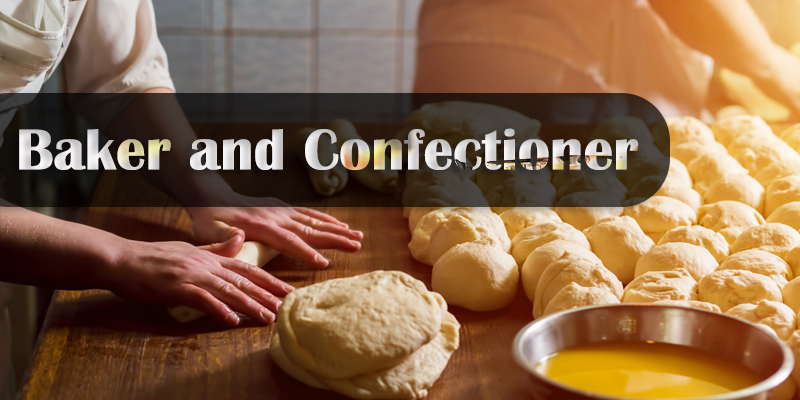
The syllabus for the ITI Trade "Baker and Confectioner" in. This one-year course, offered under the Craftsman Training Scheme (CTS) by the National Council for Vocational Training (NCVT), trains students in baking and confectionery skills for roles such as Baker, Confectioner, or Pastry Chef. The syllabus includes Trade Theory, Trade Practical, Workshop Calculation and Science, Engineering Drawing, and Employability Skills. Here’s the detailed breakdown:
1. Trade Theory
This section provides theoretical knowledge about baking and confectionery processes, equipment, and hygiene.
- Introduction to Bakery and Confectionery
- Scope and importance of the trade.
- Roles and responsibilities of a Baker and Confectioner.
- Organization chart of a bakery and its coordination with other kitchen sections.
- Bakery Tools and Equipment
- Types and uses of tools (e.g., measuring cups, rolling pins, piping bags).
- Construction and working of ovens (gas, electric, traditional).
- Basic equipment maintenance and safety.
- Raw Materials
- Structure and milling of wheat; types of flour (e.g., strong, weak).
- Role of ingredients: sugar, fats, leavening agents, flavors, and colors.
- Storage principles for raw materials.
- Baking Principles
- Aims and objectives of baking food.
- Leavening processes (chemical, biological, mechanical).
- Effects of heat on dough and batter.
- Bakery Products
- Bread varieties (e.g., rolls, sticks, soft rolls).
- Biscuits (plain, salted, piped).
- Cakes (sponge, fruit, genoise, fatless).
- Pastries and puffs (e.g., khari, Danish).
- Confectionery Products
- Types of icings (e.g., buttercream, royal, fondant).
- Candies, chocolates, toffees, and Indian sweets (e.g., gulab jamun, rasgulla).
- Puddings and desserts.
- Hygiene and Safety
- Personal hygiene and kitchen cleanliness.
- Food contamination prevention and pest control.
- Safety practices: accident prevention and first aid.
- Quality Control
- Quality checks for raw materials and finished products.
- Causes of spoilage and corrective measures.
- Entrepreneurship
- Government procedures and approvals for setting up a bakery.
- Site selection, equipment choice, and basic business management.
2. Trade Practical
This hands-on component develops practical skills in baking and confectionery.
Semester 1
- Hygiene and Cleanliness
- Maintain kitchen, equipment, and utensil hygiene.
- Use personal protective equipment (e.g., aprons, gloves).
- Basic Ingredient Handling
- Identify and measure ingredients (flour, sugar, yeast, etc.).
- Practice weighing and mixing techniques.
- Bread Making
- Prepare bread rolls, sticks, soft rolls, and rusk.
- Make khari and puff pastries.
- Quality Assessment
- Check baking quality and identify spoilage causes.
- Prepare hotel-ready bread products.
Semester 2
- Cake Preparation
- Bake various cakes (e.g., sponge, fruit, special types).
- Prepare icings (buttercream, royal, fondant).
- Pastry and Biscuit Making
- Make pastries (e.g., Danish, shortcrust).
- Prepare plain, salted, and piped biscuits.
- Confectionery Skills
- Create candies, chocolates, and toffees.
- Prepare puddings and Indian sweets (e.g., halwa, barfi).
- Project Work
- Plan and execute a complete baking and confectionery task.
- Present finished products with proper packaging.
3. Workshop Calculation and Science
This covers mathematical and scientific principles relevant to baking.
- Calculations
- Weight and volume measurements (e.g., grams, liters).
- Simple tables for ingredient proportions and conversions.
- Science
- Role of heat in baking (e.g., gelatinization, caramelization).
- Properties of leavening agents and their reactions.
4. Engineering Drawing
This focuses on basic technical drawing skills for bakery layouts.
- Drawing Basics
- Sketch simple layouts of bakery equipment and workspace.
- Use symbols for ovens, mixers, and storage units.
5. Employability Skills
This enhances professional skills for job readiness.
- Communication
- Interact effectively with colleagues and customers.
- Workplace Skills
- Time management, teamwork, and basic problem-solving.
Course Overview
- Duration: 1 year (2 semesters of 6 months each)
- Eligibility: Passed 10th class under the 10+2 system or equivalent.
- Objective: To train individuals in baking and confectionery techniques, equipment handling, and quality control, preparing them for jobs in bakeries, hotels, restaurants, or self-employment.
This syllabus aligns with the NCVT framework and may have slight variations by state or ITI. For the latest details, refer to the Directorate General of Training (DGT) website or your local ITI. The course offers practical skills for a career in the food industry with a focus on creativity and precision. Let me know if you need specific sections refined further!
Trade Type
- 17 views